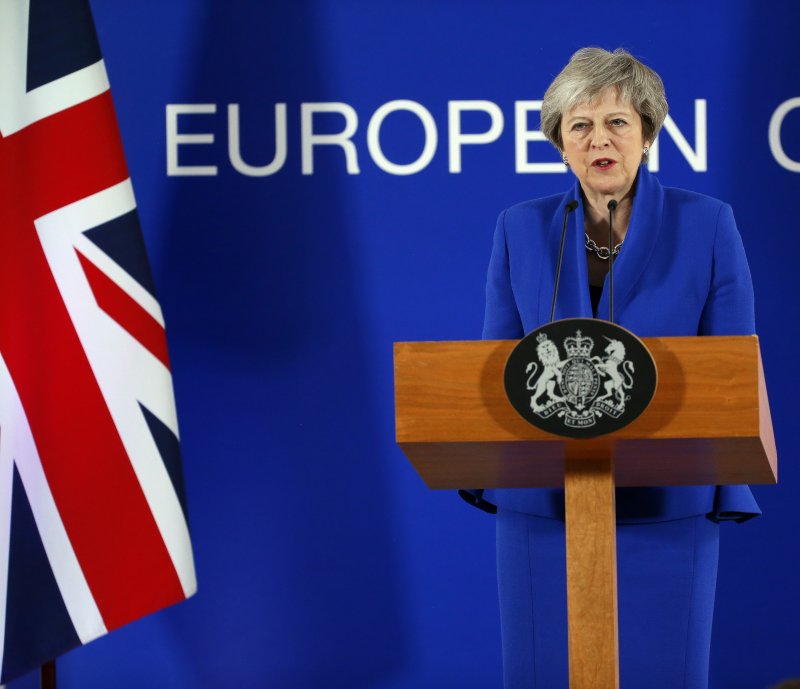British Prime Minister Theresa May speaks Sunday at a press conference at the end of European Council summit in Brussels, Belgium. The leaders of the 27 remaining EU member countries have endorsed the draft Brexit withdrawal agreement and future EU-UK relations. Photo by Julien Warnand/EPA
Nov. 25 (UPI) -- The 27 remaining leaders of the European Union on Sunday quickly approved "an orderly" withdrawal for Britain after 20 months of negotiations.
The British Parliament, which is divided on the separation, will vote on the deal in early December, according to the BBC. Afterward, the agreement will need to be approved by a majority in the European Council and then ratified by the European Parliament before the March 29 exit deadline.
Prime Minister, speaking in Brussels, Belgium, after the decision, urged Leave and Remain backers to support the agreement because it sets Britain "on course for a prosperous future."
In a letter to the British public on Saturday evening before the vote, May wrote "it is a deal for a brighter future."
Once Britain leaves the European Union, she wrote that "we will then begin a new chapter in our national life. I want that to be a moment of renewal and reconciliation for our whole coutnry. It must mark the point when we put aside the labels of 'Leave' and 'Remain' for good and we come together again as one people. To do that we need to get on with Brexit now by getting behind this deal."
One hour after the meeting started, European Council President Donald Tusk announced on Twitter: "EU27 has endorsed the Withdrawal Agreement and Political Declaration on the future EU-UK relations."
The EU approved the 585-page, legally binding document by consensus with no formal vote taken.
"The European Council invites the Commission, the European Parliament and the Council to take the necessary steps to ensure that the agreement can enter into force on 30 March 2019, so as to provide for an orderly withdrawal," the European Council said in a news release.
The Political Declaration, as part of Article 50, lays out "the framework for the future relationship between the European Union and the United Kingdom of Great Britain and Northern Ireland. The European Council restates the Union's determination to have as close as possible a partnership with the United Kingdom in the future in line with the Political Declaration."
European Council President Donald Tusk said no one should be "raising Champagne glasses" at the prospect of the UK departing.
"To see a country like Great Britain ... leave the EU is not a moment of joy nor of celebration, it's a sad moment and it's a tragedy," he said
And he said "I am not a fortune teller" in regards to what would happen if the British Parliament doesn't approve the agreement.
Lithuanian President Dalia Grybauskaite said if the UK Parliament rejected the deal, there could be an extension of the negotiations or another referendum. In 2016, Britain approved Brexit.
The agreement spells out the relationship between the European Union and Britain in trade and seurity after the separation. In addition, the "divorce bill" details citizens' rights and the Northern Ireland "backstop," which is how to keep the Irhs border open if talks don't proceed.
May said it's a "good deal that unlocks a bright future for the UK."
During the news conference, the prime minister said it would protect the constitutionality integrity of the United Kingdom.
Foreign Secretary Jeremy Hunt said Britain was getting "between 70 percent and 80 percent" of what it wanted but warned parliamentary approval was "looking challenging."
Opposition parties as well as many lawmakers within May's Conservative party and the Northern Irish DUP, which supports her minority government, have said they'll vote against it.
Former Conservative leader Iain Duncan Smith said he would find it "very, very difficult" to support the agreement.
"I don't believe that, so far, this deal delivers on what the British people really voted for," he told Sky's Sophy Ridge show. "I think it has ceded too much control."
Scottish National Party leader Nicola Sturgeon said "better alternatives" are remaining in the single market and permanent customs union. Sturgeon wanted to stay in the European Union.
May, when asked by reporters, if she would consider stepping down if the deal fails in Parliament, said "this is not about me."
"My focus for the next few weeks is making this deal possible," she said. "If people think there's another negotiation to be done, that's not the case."
On Saturday, Spanish Prime Minister Pedro Sanchez threatened to boycott the summit because he wanted guarantees how the British territory off Spain's southern coast would be treated after Great Britain's planned departure from the EU. But May agreed to give Spain veto power over Gibraltar benefiting from a future trade and security agreement.















